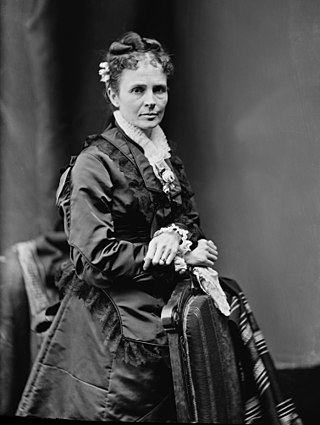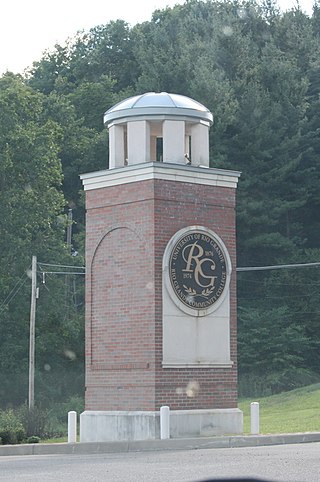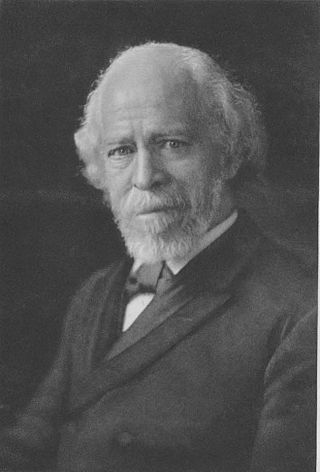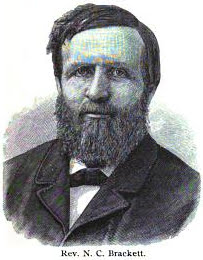
The Geauga Seminary (also known as Western Reserve Labor Seminary) was a Free Will Baptist school in Chester Township, Geauga County, Ohio. President James Garfield attended the Seminary.

The Geauga Seminary (also known as Western Reserve Labor Seminary) was a Free Will Baptist school in Chester Township, Geauga County, Ohio. President James Garfield attended the Seminary.
The school was founded in 1842 by the Western Reserve Free-Will Baptist Society and the first building was constructed in 1843. [1] Its charter prohibited any discrimination based upon race or gender. Early professors at the school included George H. Ball and Ransom Dunn, both Free Baptist clergymen from New England. President James Garfield met his wife Lucretia Garfield (Randolph) while attending Geauga. When the school closed in 1853, [2] most of its assets were acquired by Hillsdale College in Michigan, another Free Will Baptist institution. [3] The Seminary building was demolished in 1927. [4]


Hillsdale College is a private, conservative, Christian liberal arts college in Hillsdale, Michigan. It was founded in 1844 by members of the Free Will Baptists. Hillsdale's required core curriculum includes courses on the Great Books, the U.S. Constitution, biology, chemistry, and physics.

Lucretia Garfield was the first lady of the United States from March to September 1881, as the wife of James A. Garfield, the 20th president of the United States.

Cobb Divinity School was a Baptist theological institute. Founded in 1840, it was a Free Will Baptist graduate school affiliated with several Free Baptist institutions throughout its history. Cobb was part of Bates College in Lewiston, Maine, United States from 1870 until 1908 when it merged with the college's Religion Department.

James A. Garfield National Historic Site is a United States National Historic Site located in Mentor, Ohio. The site preserves the Lawnfield estate and surrounding property of James A. Garfield, the 20th president of the United States, and includes the first presidential library established in the United States.

The Smithville Seminary was a Freewill Baptist institution established in 1839 on what is now Institute Lane in Smithville-North Scituate, Rhode Island. Renamed the Lapham Institute in 1863, it closed in 1876. The site was then used as the campus of the Pentecostal Collegiate Institute and later the Watchman Institute, and is now the Scituate Commons apartments. It was placed on the National Register of Historic Places in 1978.

The University of Rio Grande and Rio Grande Community College is a private university and public community college merged into one institution in Rio Grande, Ohio. It is accredited by the Higher Learning Commission (HLC).

Chester Township is one of the sixteen townships of Geauga County, Ohio, United States. As of the 2020 census the population was 9,957 .
The American Baptist Home Mission Society is a Christian missionary society. Its main predecessor the Home Mission Society was established in New York City in 1832 to operate in the American frontier, with the stated mission "to preach the Gospel, establish churches and give support and ministry to the unchurched and destitute." In the 19th century, the Society was related to the Triennial Convention of Baptists. Today it is part of that Convention's successor, the American Baptist Churches, USA, and is the successor by merger of several 19th century Baptist organizations related to missions and education, including publications (1824), women (1877), and education (1888).

William J. Simmons was an American Baptist pastor, educator, author, and activist. He was formerly enslaved person, who became the second president of Simmons College of Kentucky (1880–1890), for whom the school was later named.

John Jay Butler was an ordained minister and theologian in the early Free Will Baptist movement in New England, serving as Professor of Systematic Theology at Cobb Divinity School at Bates College in Maine and later at Hillsdale College in Michigan.

Rev. Ransom Dunn, D.D. was an American minister and theologian, prominent in the early Free Will Baptist movement in New England. He was President of Rio Grande College in Ohio, and Hillsdale College in Michigan. A Discourse on the Freedom of the Will is one of his most notable works.

The Auburn Free Will Baptist Church is a historic former Baptist church building in Auburn Township, Geauga County, Ohio, United States. Constructed in the second quarter of the nineteenth century, it is no longer home to the congregation that built it, but it remains a significant component of the area's built environment, and it has been named a historic site.

Charles Gordon Ames was an American Unitarian clergyman, editor and lecturer.

Richard DeBaptiste was a Baptist minister in Chicago, Illinois. Before the abolition of slavery, he was an abolitionist and worked with his close relative, George DeBaptiste in the Underground Railroad, mainly in Detroit, Michigan. His ministry took him to Ohio, and in 1863, to Olivet Baptist Church in Chicago. He was a leader in the local and national Baptist community. He also was a journalist, serving as editor or correspondent to various newspapers and journals.

Nathan Cook Brackett (1836–1910) was an abolitionist, Free Will Baptist pastor, first president of Storer College, and chairman and co-founder of Bluefield State College.

George Harvey Ball (1819-1907) was an American academic, pastor, writer, and founder of Keuka College in New York.

George T. Day (1822–1875) was a Free Will Baptist writer, publisher, pastor and professor.
Daniel McBride Graham (1817–1888) was a Free Will Baptist pastor, abolitionist, writer, and inventor who served as the first president of Hillsdale College, serving from 1844 to 1848 and the fourth president from 1871 to 1874.

Robert Page Sims (1872–1944) was an early African American academic, civil rights leader, scientist, and college president who held positions at Virginia University of Lynchburg and Bluefield State College.